宾语从句翻译方法
2021考研《英语》主要从句四大翻译技巧

2021考研《英语》主要从句四大翻译技巧大多数翻译理论都认为,翻译是一个原文意思的再现过程。
这个过程可以分为两个部分。
一是原文的理解过程。
二是目的语的组织过程。
可见,翻译的准确实现首先取决于原文的理解。
而译文的通顺表达则取决于对目的语的运用技能。
考研英语翻译的特点是句子结构较为复杂,准确理解句子结构,以及把这些结构之间的逻辑语义再重现出来,成为考研英语翻译非常重要的部分。
要把原文的逻辑语义真实再现,我们要注意积累几大英语结构的理解和翻译方法。
下面,万学海文英语考研辅导老师们就为2021年考研的同学们总结出英语中名词性从句、定语从句、状语从句、被动句以及否定结构的翻译方法。
一、名词性从句的翻译方法名词在句子中的成分有可能是:主语、宾语、表语、以及同位语。
相应地,名词性从句有四类:主语从句,宾语从句,同位语从句和表语从句。
这四类名词性从句翻译过程中一般都遵循一个原则,如果翻译成汉语句子比较简单,不会造成主句的失衡现象,就可以翻译成从句本来应该承担的成分,进行顺译;但是,如果从句结构较为复杂,而主句较为简单,则适宜把从句单独成句翻译,主句中使用代词指代这个从句。
下面我们来具体看一下翻译方法:1、主语从句:构成主语从句的方式有下列两种:(1)关联词或从属连词位于句首的从句+主句谓语+其他成分。
它们一般是译在句首,作为主从复合句的主语。
这样的词有关联词what,which,how,why,where,who,whatever,whoever,whenever,wherever及从属连词that,whether,if.如:例题1:What he told me was only half-truth.分析:其中关联词可译“…的”,放在后面。
参考译文:他告诉我的只是些半真半假的东西而已。
例题2:Whether an organism is a plant or an animal sometimes taxes the brain of a biologist.分析:whether可以译成“是否,是…还是”,然后适当安排位置。
宾语从句
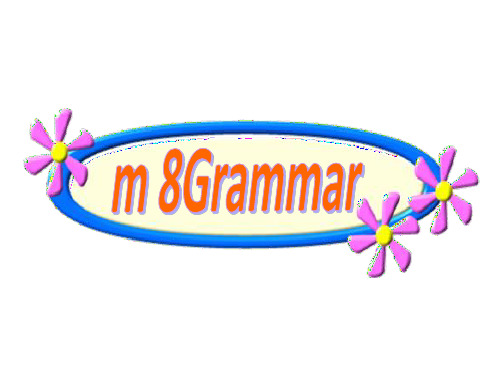
• ―It is an exciting film‖ Tony says. • Tony says ( that) it was an exciting film
时态人称变化 1.主句为一般现在时和一般将来时,间接引语时态不变
• I said you had ____ _____ my homework. done
• I said you ____ ____ my homework. had done
一般将来时---过去将来时 will do ---would do 现在完成时---过去完成时 have/has done ----had done
由从属连词whether, if 引导的宾语从句 eg.
8.I want to know ,―will he go to the park with us?‖ (whether) he will go to the park with us 8.I want to knowif____________________.
5. Can you tell me ____ why you came to school late today? which film they saw 6. Do you know ______ yesterday evening? 7. My uncle asked __________ if / whether I would like to visit the Summer Palace with him. 8. I didn‘t know ____ who they were waiting for over there. 9. Linda wants to know __________ whether / if they can go camping on Sunday or not. how you did the maths 10. Please show me ____ problem yesterday.
从句的译法
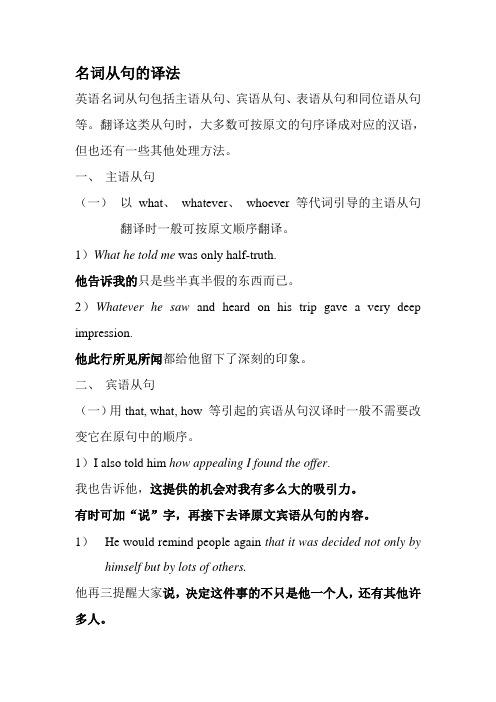
名词从句的译法英语名词从句包括主语从句、宾语从句、表语从句和同位语从句等。
翻译这类从句时,大多数可按原文的句序译成对应的汉语,但也还有一些其他处理方法。
一、主语从句(一)以what、whatever、whoever 等代词引导的主语从句翻译时一般可按原文顺序翻译。
1)What he told me was only half-truth.他告诉我的只是些半真半假的东西而已。
2)Whatever he saw and heard on his trip gave a very deep impression.他此行所见所闻都给他留下了深刻的印象。
二、宾语从句(一)用that, what, how 等引起的宾语从句汉译时一般不需要改变它在原句中的顺序。
1)I also told him how appealing I found the offer.我也告诉他,这提供的机会对我有多么大的吸引力。
有时可加“说”字,再接下去译原文宾语从句的内容。
1)He would remind people again that it was decided not only by himself but by lots of others.他再三提醒大家说,决定这件事的不只是他一个人,还有其他许多人。
三、表语从句英语表语从句和宾语从句一样,一般可按原文顺序翻译。
1)What he emphasized over and over again was that no matter how difficult it might be, they should never retreat even for an inch.他所再三强调的是,不管多么困难,他们决不应该后退寸步。
2) That was how a small nation won the victory over a big power.就这样,小国战胜了大国。
宾语从句、表语从句和同位语从句等。翻译时大多数可译成

英语名词从句包括主语从句、宾语从句、表语从句和同位语从句等。
翻译时大多数可译成相对应的汉语,但也还有一些其它处理方法。
下面分别加以介绍:一、主语从句1.以what, whatever, whoever等代词引导的主语从句一般可按原文顺序翻译,例如:What he told me is only half-truth.他告诉我的只是些半真半假的东西而己2.以“it”作形式主语的主语从句1)逻辑主语从句如提前译出,有两种情况:若强调,“it”一般可译出来;如不强调,“it”可不译出来。
It doesn't make much difference whether he attends the meeting or not.他参不参加会议没有多大关系。
(不强调)It seemed inconceivable that the pilot could have survived the crash.在飞机坠毁之后,驾驶员竟然还能活着,这看来是不可想象的。
(强调)2)逻辑主语从句不提前,“it”一般不需译出。
It is suggested that the meeting should be canceled.有人建议取消会议。
二、宾语从句1.用that, what, how等引起的宾语从句汉译时一般不须改变顺序。
I told him that because of the last condition,I′d have to turn it down.我告诉他,由于那最后一个条件,我只得谢绝。
2.用“it”作形成宾语的句子,that宾语从句可按原文顺序译出,“it”可不译。
I made it clear to them that they must hand in their papers before 10 o′clock in the morning.我向他们讲清楚了的,他们必须在上午十时前交卷。
英译汉的层次(句子翻译)

• There are something original, independent, and
heroic about the plan that please them all.
• 这个方案富于创造性,独出心裁,很有魄力, • 所以使所有人都很喜欢它。(果)
• Those who are in favour please hold up their
wonder 【 whether he will come in such a bad day】. 我不知道在这样的天气里他 是不是能来。
• that引导 eg: 【 That you have done such a stupid thing】
was incredible. 你竟然做这么傻的事情,(这)真叫人难以置信。
• 行为主义者认为, 如果儿童的成长环境里 有许多刺激因素, 这些因素又有利于其适 当反应能力的发展, 那么, 儿童的智力就 会发展到较高的水平。
24
• 例2. For a family of four, for example, it is more convenient as well as cheaper to sit comfortably at home, with almost unlimited entertainment available, than to go out in search of amusement elsewhere.
• (2)表语从句的译法 • (3)宾语从句的译法
顺译法 在主句谓语动词和宾语从句间断开
• (4)同位语语
4
分译法
• What引导 eg: 【What was once regarded as
宾语从句的翻译技巧
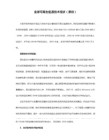
Can you hear what I say?
你听得到我所讲的吗?
I don’t know that he swam across the river.
我不知道他游过了那条河。
I don’t know how he swam across the river.
斯密斯回答说,他感到遗憾。
He would remind people again that it was decided not only by himself but by lots of others.
他再三提醒大家说,决定这件事的不只是他一个人,还有其他许多人。
(2)用it 作形式宾语的句子,在翻译的时候,that所引导的宾语从句一般可按英语原文顺序翻译;it有时候可以不用翻译。
I made it clear to them that they must hand in their papers before 10 o’clock in the morning.
我向他们讲清楚了的,他们必须在上午十时前交卷。(it没有翻译)
I heard it said that he had gone abroad.
We consider it absolutely necessary that we should open our door to the outside world.
打开国门,实行开放,我们认为这是绝对必要的。(it翻译为“这”)
宾语从句的翻译技巧
宾语从句
(1)用that, what, how, when, which, why, whether, if 等引起的宾语从句,翻译成汉语的时候,一般不需要改变它在原句中的顺序。
宾语从句who的用法归纳总结
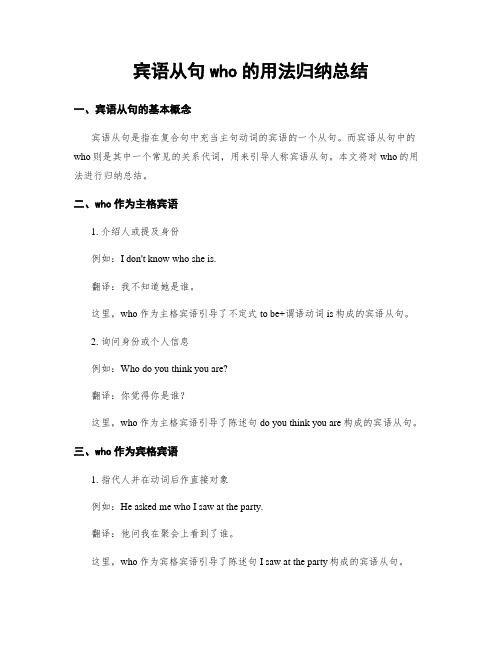
宾语从句who的用法归纳总结一、宾语从句的基本概念宾语从句是指在复合句中充当主句动词的宾语的一个从句。
而宾语从句中的who则是其中一个常见的关系代词,用来引导人称宾语从句。
本文将对who的用法进行归纳总结。
二、who作为主格宾语1. 介绍人或提及身份例如:I don't know who she is.翻译:我不知道她是谁。
这里,who作为主格宾语引导了不定式to be+谓语动词is构成的宾语从句。
2. 询问身份或个人信息例如:Who do you think you are?翻译:你觉得你是谁?这里,who作为主格宾语引导了陈述句do you think you are构成的宾语从句。
三、who作为宾格宾语1. 指代人并在动词后作直接对象例如:He asked me who I saw at the party.翻译:他问我在聚会上看到了谁。
这里,who作为宾格宾语引导了陈述句I saw at the party构成的宾语从句。
2. 引导介词后面的从属关系例如:She gave the flowers to him who helped her.翻译:她把鲜花给了那个帮助她的人。
这里,who作为宾格宾语引导了陈述句helped her构成的宾语从句。
四、who作为定语从句1. 修饰具体指人的先行词例如:The man who is talking to my mother is a doctor.翻译:和我妈妈说话的那个男人是医生。
这里,who作为定语从句引导了is talking to my mother构成的修饰性从句。
2. 修饰泛指人的先行词例如:Those who work the hardest will succeed.翻译:那些工作最努力的人将会成功。
这里,who作为定语从句引导了work the hardest构成的修饰性从句。
五、who在特殊问句中的用法1. 引导特殊疑问句例如:Who is coming to the party tonight?翻译:今晚谁来参加聚会?这里,who作为特殊疑问代词用来询问聚会上要来参加的人。
中考英语复习宾语从句讲解+练习
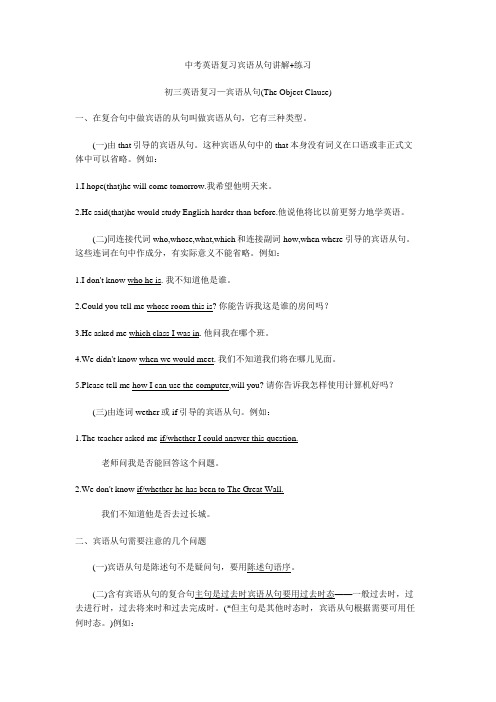
中考英语复习宾语从句讲解+练习初三英语复习—宾语从句(The Object Clause)一、在复合句中做宾语的从句叫做宾语从句,它有三种类型。
(一)由that引导的宾语从句。
这种宾语从句中的that本身没有词义在口语或非正式文体中可以省略。
例如:1.I hope(that)he will come tomorrow.我希望他明天来。
2.He said(that)he would study English harder than before.他说他将比以前更努力地学英语。
(二)同连接代词who,whose,what,which和连接副词how,when where引导的宾语从句。
这些连词在句中作成分,有实际意义不能省略。
例如:1.I don't know who he is. 我不知道他是谁。
2.Could you tell me whose room this is? 你能告诉我这是谁的房间吗?3.He asked me which class I was in. 他问我在哪个班。
4.We didn't know when we would meet. 我们不知道我们将在哪儿见面。
5.Please tell me how I can use the computer,will you? 请你告诉我怎样使用计算机好吗?(三)由连词wether或if引导的宾语从句。
例如:1.The teacher asked me if/whether I could answer this question.老师问我是否能回答这个问题。
2.We don't know if/whether he has been to The Great Wall.我们不知道他是否去过长城。
二、宾语从句需要注意的几个问题(一)宾语从句是陈述句不是疑问句,要用陈述句语序。
(二)含有宾语从句的复合句主句是过去时宾语从句要用过去时态——一般过去时,过去进行时,过去将来时和过去完成时。
从句的翻译
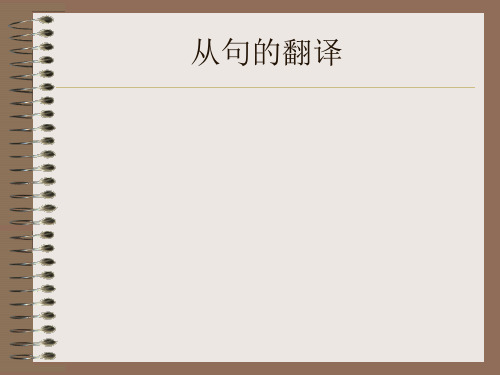
五ቤተ መጻሕፍቲ ባይዱ定语从句的译法
• 英语定语从句的译法主要涉及到限制性 定语从句的译法和非限制性定语从句的 译法。此外,有些英语定语从句和主句 间还存在着状语关系,对这种定语从句 也值得探讨。
(一)限制性定语从句
• 限制性定语从句对所修饰的先行词起限 制作用,与先行词关系密切,不用逗号 分开。翻译这类句子时往往可以用:
从句的翻译
• 英语中有主语从句、宾语从句、表语从 句、定语从句(含同位语从句)、状语 从句等。
一.主语从句
• (一)以what, whatever, whoever 等代词引导 的主语从句一般按原文语序翻译。 • 1) What he told me really surprised me. • 他所告诉我的着实让我吃惊。 • 2)Whatever he saw and heard on his trip gave him a very deep impression. • 他此行所见所闻都给他留下了深刻印象。 • 3) Whoever has traveled in that region must remember the waterfalls. • 凡是到过那个地区的人是一定记得那些瀑布 的
• 3) We have to face the fact that our prospects were less than good. • 我们不得不正视这样一个事实:我们的 前景并不乐观。 • 4) There was the chance that a small electrical spark might lead to a big fire. • 有这样的可能——一 一个小小的电火花 可能引起一场大火。
(二)用it作假宾语的句子, 汉译时that 引起的宾语从句一 般按原文顺序;it不译 。
宾语从句的译法

• She had explained that interviews were the only way to keep the case in public 不至忘却这桩 案件的唯一办法。
二、 介词引导的宾语从句
介词宾语从句前面的介词一般和动词,形 词或副词有关。翻译时,顺序一般不变。 Men differ from brutes in that they can think and speak. 人与兽的区别就在于人有思维而且会说话。
有时可加“说”字,再接下去译原文宾 语从句的内容
• He would remind people again that it was decided not only by himself but by lots of others.
• 他再三提醒大家说,决定这件事的不只是 他一个人,还有其他很多人。
定义
在主句作宾语成分的句子叫宾语从句
1、动词引导的宾语从句 2、介词引导的宾语从句 3、it 做形式宾语的宾语从句
4、直接引语做宾语从句
• 首先划分意群,确定哪个是主句哪个是从 句 • 然后采用顺译法将每个意群译出
一、 动词引导的宾语从句
• 由that, what, how等引导的宾语从句汉译时 一般不需要改变它在原句中的顺序。 • He would never let the history books say of him that he had been content to sit on the sidelines, to be a gentle, leisurely President, letting events take their course. 他绝不肯让将来的历史书说他甘于当一个 袖手旁观、悠闲文雅而听任事情自流的总 统。
2020考研英语:宾语从句的翻译
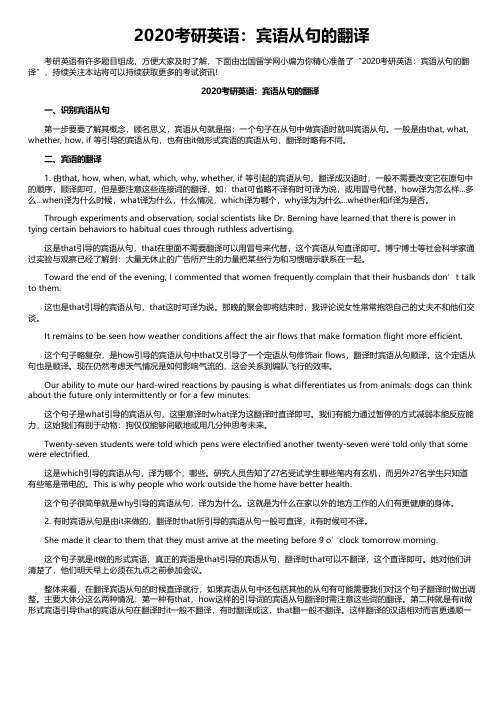
2020考研英语:宾语从句的翻译 考研英语有许多题目组成,方便大家及时了解,下面由出国留学网小编为你精心准备了“2020考研英语:宾语从句的翻译”,持续关注本站将可以持续获取更多的考试资讯! 2020考研英语:宾语从句的翻译 一、识别宾语从句 第一步要要了解其概念,顾名思义,宾语从句就是指:一个句子在从句中做宾语时就叫宾语从句。
一般是由that, what, whether, how, if 等引导的宾语从句,也有由it做形式宾语的宾语从句,翻译时略有不同。
二、宾语的翻译 1. 由that, how, when, what, which, why, whether, if 等引起的宾语从句,翻译成汉语时,一般不需要改变它在原句中的顺序,顺译即可,但是要注意这些连接词的翻译,如:that可省略不译有时可译为说,或用冒号代替,how译为怎么样...多么...when译为什么时候,what译为什么,什么情况,which译为哪个,why译为为什么...whether和if译为是否。
Through experiments and observation, social scientists like Dr. Berning have learned that there is power in tying certain behaviors to habitual cues through ruthless advertising. 这是that引导的宾语从句,that在里面不需要翻译可以用冒号来代替,这个宾语从句直译即可。
博宁博士等社会科学家通过实验与观察已经了解到:大量无休止的广告所产生的力量把某些行为和习惯暗示联系在一起。
Toward the end of the evening, I commented that women frequently complain that their husbands don’t talk to them. 这也是that引导的宾语从句,that这时可译为说。
英译汉翻译方法介绍---句子的翻译
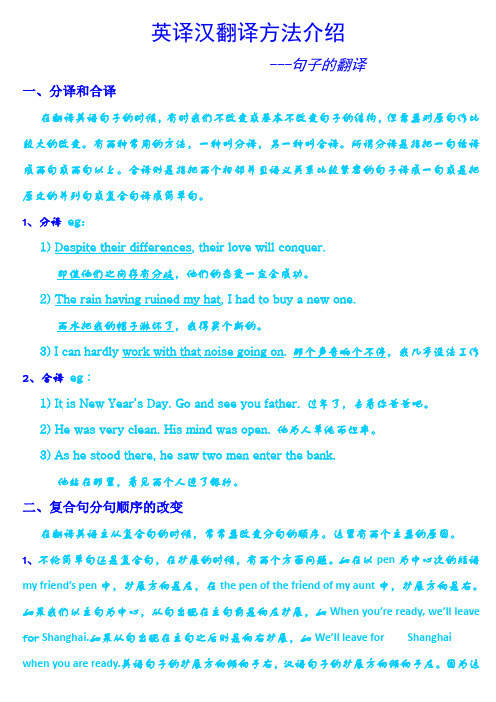
英译汉翻译方法介绍---句子的翻译一、分译和合译在翻译英语句子的时候,有时我们不改变或基本不改变句子的结构,但需要对原句作比较大的改变。
有两种常用的方法,一种叫分译,另一种叫合译。
所谓分译是指把一句话译成两句或两句以上。
合译则是指把两个相邻并且语义关系比较紧密的句子译成一句或是把原文的并列句或复合句译成简单句。
1、分译eg:1) Despite their differences, their love will conquer.即使他们之间存有分歧,他们的恋爱一定会成功。
2) The rain having ruined my hat, I had to buy a new one.雨水把我的帽子淋坏了,我得买个新的。
3) I can hardly work with that noise going on. 那个声音响个不停,我几乎没法工作2、合译eg:1) It is New Year’s Day. Go and see you father. 过年了,去看你爸爸吧。
2) He was very clean. His mind was open. 他为人单纯而坦率。
3) As he stood there, he saw two men enter the bank.他站在那里,看见两个人进了银行。
二、复合句分句顺序的改变在翻译英语主从复合句的时候,常常要改变分句的顺序。
这里有两个主要的原因。
1、不论简单句还是复合句,在扩展的时候,有两个方面问题。
如在以pen为中心次的短语my friend’s pen中,扩展方向是左,在the pen of the friend of my aunt中,扩展方向是右。
如果我们以主句为中心,从句出现在主句前是向左扩展,如When you’re ready, we’ll leave for Shanghai.如果从句出现在主句之后则是向右扩展,如We’ll leave for Shanghai when you are ready.英语句子的扩展方向倾向于右,汉语句子的扩展方向倾向于左。
宾语从句
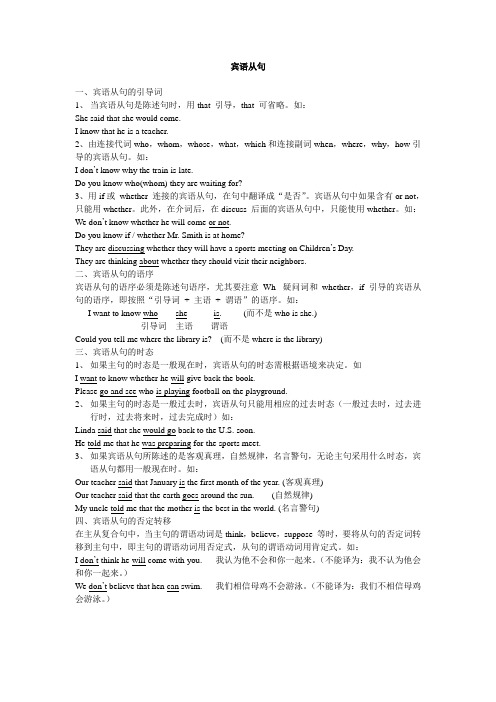
宾语从句一、宾语从句的引导词1、当宾语从句是陈述句时,用that 引导,that 可省略。
如:She said that she would come.I know that he is a teacher.2、由连接代词who,whom,whose,what,which和连接副词when,where,why,how引导的宾语从句。
如:I don’t know why the train is late.Do you know who(whom) they are waiting for?3、用if或whether 连接的宾语从句,在句中翻译成“是否”。
宾语从句中如果含有or not,只能用whether。
此外,在介词后,在discuss 后面的宾语从句中,只能使用whether。
如:We don’t know whether he will come or not.Do you know if / whether Mr. Smith is at home?They are discussing whether they will have a sports meeting on Children’s Day.They are thinking about whether they should visit their neighbors.二、宾语从句的语序宾语从句的语序必须是陈述句语序,尤其要注意Wh- 疑问词和whether,if 引导的宾语从句的语序,即按照“引导词+ 主语+ 谓语”的语序。
如:I want to know who she is. (而不是who is she.)引导词主语谓语Could you tell me where the library is? (而不是where is the library)三、宾语从句的时态1、如果主句的时态是一般现在时,宾语从句的时态需根据语境来决定。
英译汉翻译方法介绍---句子的翻译
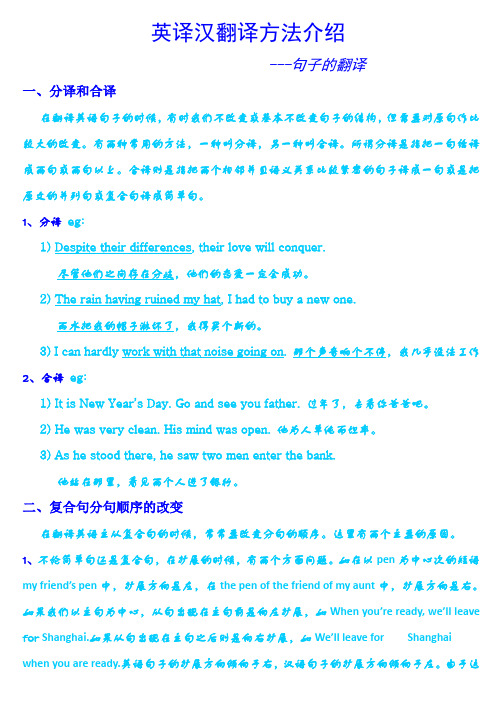
英译汉翻译方法介绍---句子的翻译一、分译和合译在翻译英语句子的时候,有时我们不改变或基本不改变句子的结构,但需要对原句作比较大的改变。
有两种常用的方法,一种叫分译,另一种叫合译。
所谓分译是指把一句话译成两句或两句以上。
合译则是指把两个相邻并且语义关系比较紧密的句子译成一句或是把原文的并列句或复合句译成简单句。
1、分译eg:1) Despite their differences, their love will conquer.尽管他们之间存在分歧,他们的恋爱一定会成功。
2) The rain having ruined my hat, I had to buy a new one.雨水把我的帽子淋坏了,我得买个新的。
3) I can hardly work with that noise going on. 那个声音响个不停,我几乎没法工作2、合译eg:1) It is New Year’s Day. Go and see you father. 过年了,去看你爸爸吧。
2) He was very clean. His mind was open. 他为人单纯而坦率。
3) As he stood there, he saw two men enter the bank.他站在那里,看见两个人进了银行。
二、复合句分句顺序的改变在翻译英语主从复合句的时候,常常要改变分句的顺序。
这里有两个主要的原因。
1、不论简单句还是复合句,在扩展的时候,有两个方面问题。
如在以pen为中心次的短语my friend’s pen中,扩展方向是左,在the pen of the friend of my aunt中,扩展方向是右。
如果我们以主句为中心,从句出现在主句前是向左扩展,如When you’re ready, we’ll leave for Shanghai.如果从句出现在主句之后则是向右扩展,如We’ll leave for Shanghai when you are ready.英语句子的扩展方向倾向于右,汉语句子的扩展方向倾向于左。
各种从句的翻译

他看起来好像昨晚没睡好。
分析
在这个句子中,“as if he hasn't had a good night's sleep”是表语从句,对主语“He”进行描述。在翻译时 ,可以将引导词“as if”翻译为“好像”,将句子翻译为 “他看起来好像昨晚没睡好”。
04 同位语从句的翻译
CHAPTER
状语从句的翻译技巧
理解从句的语义关系
在翻译状语从句时,首先要理解从句与主句 之间的语义关系,确定从句在句子中的作用 和含义。
调整语序
由于中英文表达习惯的不同,翻译时可能需要对语 序进行调整,使译文更加符合目标语言的表达习惯 。
选用合适的引导词
在翻译过程中,需要根据从句的语义关系选 择合适的引导词,确保译文的准确性和流畅 性。
例句2
The book which you lent me was very interesting.
翻译
我们班有个女孩,她的父亲是位 著名的科学家。(融合法)
例句3
There is a girl in our class whose father is a famous
scientist.
翻译
你借给我的那本书很有趣。(后 置法)
主语从句的翻译技巧
顺译法
01
按照汉语的表达习惯,将主语从句放在句首进行翻译。
倒译法
02
为了符合汉语的表达习惯,将主语从句放在句末进行翻译,同
时用“这”、“那”等代词复指。
融合法
03
将主语从句和主句融合在一起进行翻译,使译文更加流畅自然
。
案例分析
案例一
案例二
That the earth goes round the sun is known to all. 地球绕着太阳转是众所周知 的。
6各种从句的翻译解析

24
三、表示条件的状语从句
译成表“条件”的分句 译成表“假设”的分句 译成表补充说明情况的分句
25
译成表“条件”的分句 1. It was better in case they were captured. 要是把他们捉到了,那就更好了。
26
译成表“假设”的分句 If one of them collapsed, as they often did, the guide used to carry him over the mountains. 如果其中一个人垮了,这种事时常在他们中间发 生,向导就要背着他过山。
17
3.When censorship laws are relaxed, dishonest people are given a chance to produce virtually anything in the name of “art”
当审查放宽时, 招摇撞骗之徒就会有机可乘, 在“艺术”的幌子下炮制出形形色 色的东西 来。
10
用it作假宾语的句子,it可不译。
I made it clear to them that they must hand in their papers before 10 o'clock in the morning. 我向他们讲清楚了的,他们必须在上午十点以 前交卷。
11
状语从句的翻译
15
一、时间状语从句的译法
译成相应的表示时间的状语 译成“刚……就……”的句式 译成并列分句
16
一、时间状语从句的译法
译成相应的表示时间的状语 1. While she spoke, the tears were running down. 她说话时,泪水直流。 2.Pleasae turn off the lights when you leave the room. 离屋时请关灯。
初中英语三大从句总结

初中英语三大从句总结在初中的英语学习中,主要有三大从句,即宾语从句、定语从句、状语从句(包括时间、条件、结果、目的、原因、让步、地点、方式等)。
今天为大家整理了“从句”相关的知识点,!赶快学起来吧~01宾语从句一、定义在句子中起宾语作用的从句叫做宾语从句。
二、连接词that: I think that you can pass the exam.Whether/if: I don’t know what the word means.“Wh”:I don’t know what the word means.I don’t know where he found the book.只用whether的情况:1. 与or not连用:I don’t know whether it’s raining or not.2. 与动词不定式连用:He doesn’t know whether to accept the invitation.3. 连接词前有介词时:It depends on whether he is coming.三、时态1. 主句是一般现在时态,从句根据实际情况而定(各种时态均可)She wants to know what he has done for the exam.2.主句是一般过去时态,从句用相应的过去的时态。
She said that she was a student.She said that she would fly to Japan in a week.She said that she had finished her homework already.3. 如果宾语从句说的是客观真理、自然现象或事实时,这时宾语从句要用一般现在时态。
The teacher said that the earth goes round the sun.02定语从句一、定义在复合句中修饰名词、代词的从句叫定语从句。
中考英语重点语法三大从句总结
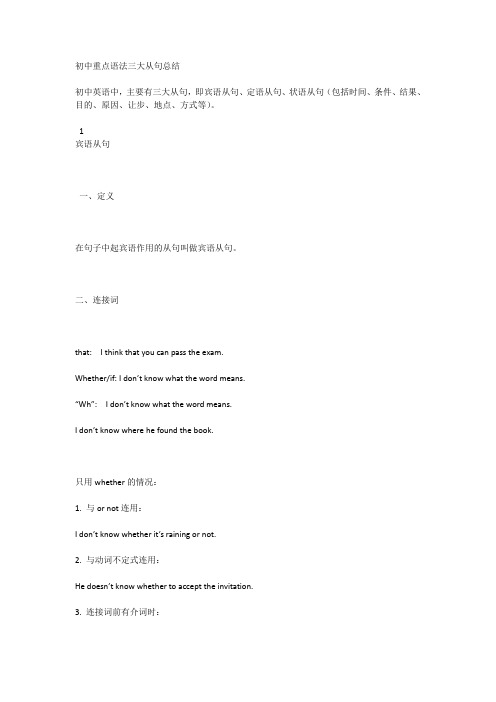
When the children had gone to bed, she began to prepare her lessons.
While ---在……期间,往往指一段时间。
While we were inAmerica, we saw him twice.
While ---表示一种不满情绪,意思是这边在干某种重要的事,而另一边在享受等。
If ---如果
If you don’t hurry up, you will miss the plane.
Unless ---如果不,除非=if not
We can’t get there on time unless we book the earliest flight
As long as ---只要
We will succeed as long as we keep on trying.
As (so) far as ---据……所知
As far as I know, he speaks English very well.
In case ---假使,如果
The plane cannot take off in case it rains.
Wherever ---无论哪里
Wherever you are, I will be right there waiting for you.
4.原因状语从句
because, as, since, now that,和considering that, seeing that这六个连词都用于表示表示原因,但在语气上一个比一个弱.
It is just a week since we arrived here.
宾语从句和让步状语从句的用法
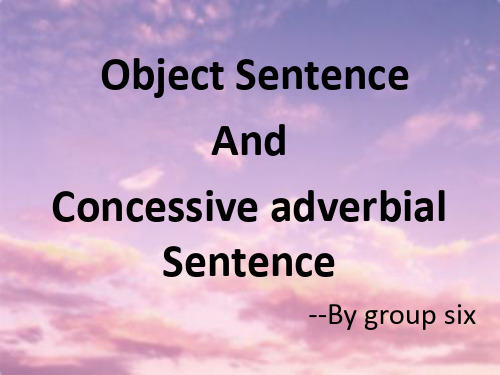
2.介词的宾语从句 用wh-类引导的介词宾语从句
We areБайду номын сангаасtalking about whether we admit students into our club. 我们正在讨论是否让学生加入我们的俱乐部. 用that,if引导的介词宾语从句 有时候except,but,besides三个介词后可见到that引 导的宾语从句
Object Sentence
And
Concessive adverbial Sentence
--By group six
宾语从句是名词性从句的一种,是在主从复合
句中充当宾语,位于及物动词、介词或复合谓语 之后的从句。 宾语: We believe you. 宾语从句: I believe that you can do it.
I am sure I will pass the exam. 我确信我会通过考试. I am certain that he will deliver on his promise. 我确定他会履行诺言。
让步状语从句
是状语从句中的一种,其本身也是状语从句。一般 翻译为“尽管....或.即使….”。
1.动词的宾语从句 大多数动词都可以带宾语从句 He told us that they would help us though the whole work. 他告诉我们在整个工作中,他都会帮忙的. 部分“动词+副词”结构也可以带宾语从句 I have found out that all the tickets for the concert have been sold out. 我发现这场音乐会的所有票都卖光了.
even though 引导让步状语从句时,是以从句的内 容为先决条件的,即说话人肯定了从句的事实,表 示已经发生了的事。
- 1、下载文档前请自行甄别文档内容的完整性,平台不提供额外的编辑、内容补充、找答案等附加服务。
- 2、"仅部分预览"的文档,不可在线预览部分如存在完整性等问题,可反馈申请退款(可完整预览的文档不适用该条件!)。
- 3、如文档侵犯您的权益,请联系客服反馈,我们会尽快为您处理(人工客服工作时间:9:00-18:30)。
宾语从句可以分为两种:一种是动词引导的宾语从句;另一种是介词引导的宾语从句。
一、动词引导的宾语从句
翻译时,顺序一般不变。
如:
Manure supplies what is deficient in the soil.
参考译文:肥料供给土壤所缺乏的成分。
二、介词引导的宾语从句
介词宾语从句前面的介词可能和动词、形容词或副词有关。
翻译时,顺序一般不变。
如:
Men differ from brutes in that they can think and speaks.
分析:in之后如果跟有宾语从句,常常可译成原因状语从句,用因为…,在于…,是因为…等词译出。
参考译文:人与兽的区别,就在于人有思维而且会说话。
The lift component is not vertical except when the relative wind is horizontal.
分析:英语中的介词except, but, besides等之后如果跟有宾语从句,常常可译为并列句的分句,用除…之外,除了…,此外…,只是…,但…等词译出。
参考译文:除了相对风是水平的情况之外,升力不是垂直的。
三、直接引语作宾语
从句翻译时引号保留,把逗号一律改为冒号。
如:
The student asked the teacher,how many one cubic foot of air weighs under normal conditions?
参考译文:这个学生问老师:一立方英尺空气有多重?
The law of conservation and transformation of energy states that energy is indestructible and the total amount of energy in the universe is constant.
分析:以that引导的宾语从句为普遍真理及一般规律时,或是某一规律及定义所阐述的内容时,有时也可以在句首加冒号译出。
参考译文:能量守恒和转换定律说明:能量是不灭的,宇宙间能量的总量和是不变的。
